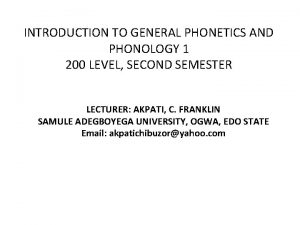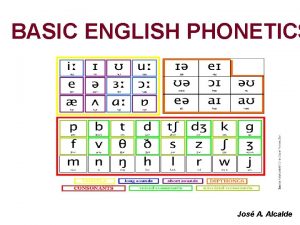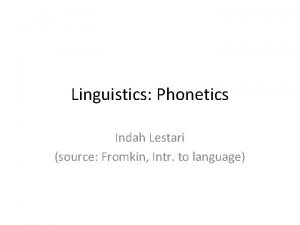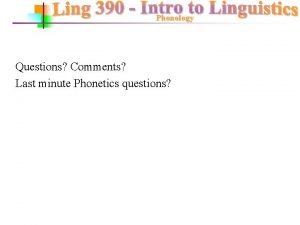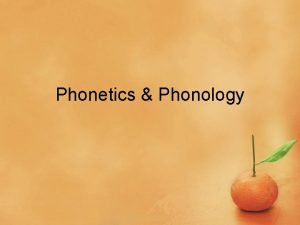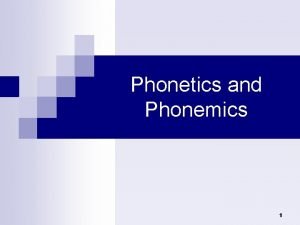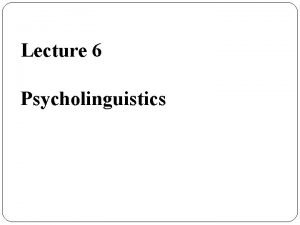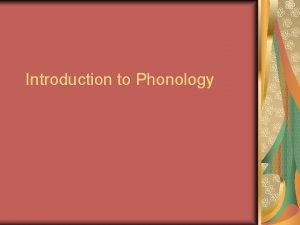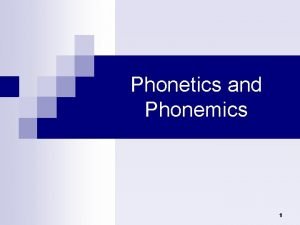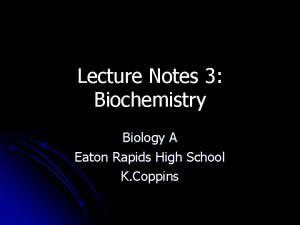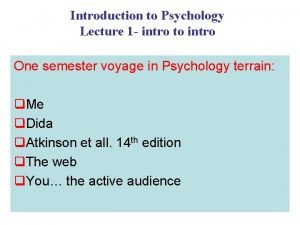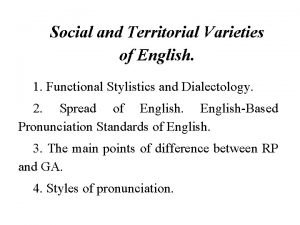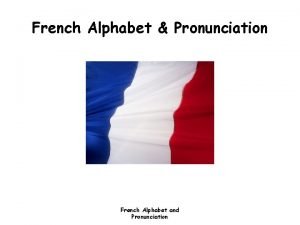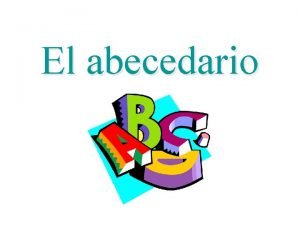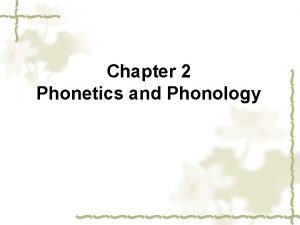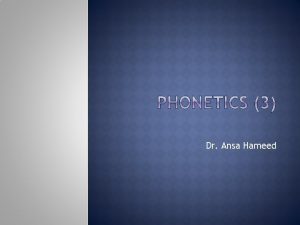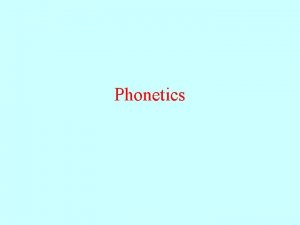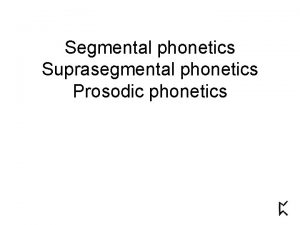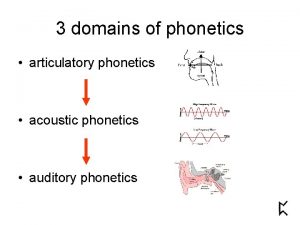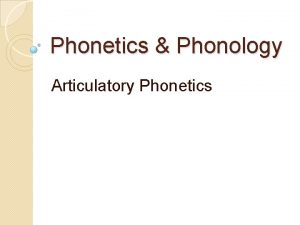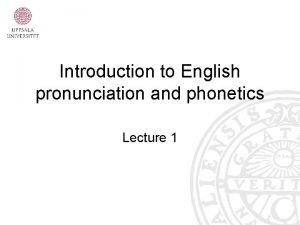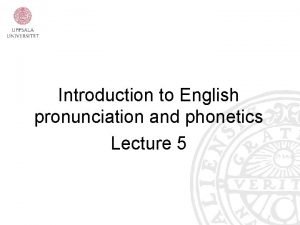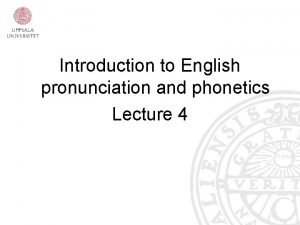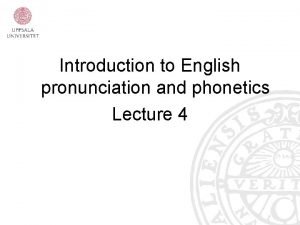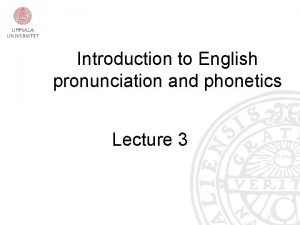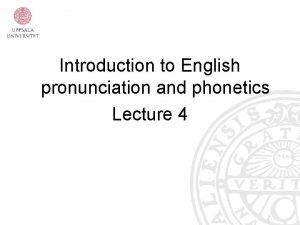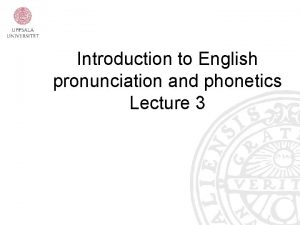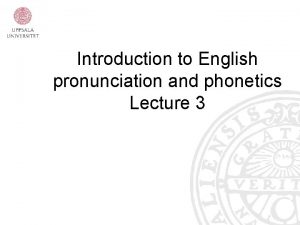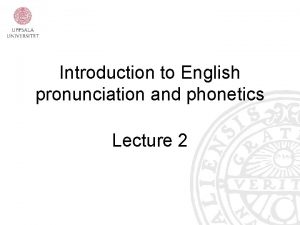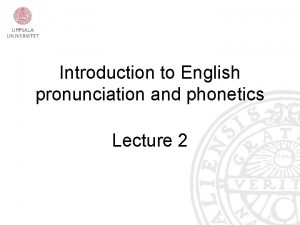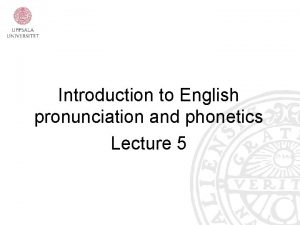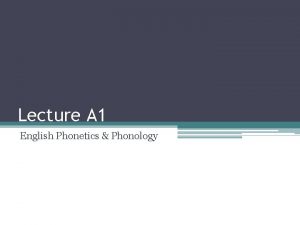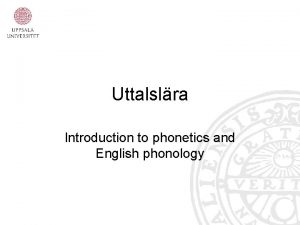Introduction to English pronunciation and phonetics Lecture 2

























- Slides: 25

Introduction to English pronunciation and phonetics Lecture 2

Diphthongs • a glide between two vowel sounds (di- = two); “double vowel” • two types of diphthongs centring (as in near /ıə/) closing (as in sky /aı/) • English has seven distinctive diphthongs

/eı/ as in ‘say’ Examples raven train weigh/ way Compare /ˈreıvən/ /treın/ /weı/ Sw ‘mig, nej’ Eng ‘May, neigh’

/aı/ as in ‘time’ Examples night/knight die/dye sigh Compare /naıt/ /daı/ /saı/ Sw ‘aj, maj’ Eng ‘I, my’

/ɔı/ as in ‘toy’ Examples moist /mɔıst/ soil /sɔıl/ coin /kɔın/ Compare Sw ‘koj, boj’ Eng ‘coy, boy’

/aʊ/ as in ‘scout’ Examples noun /naʊn/ howl /haʊl/ out /aʊt/ Note! country /ʌ/ pause /ɔ: / astronaut /ɔ: /

/əʊ||o(ʊ)/ as in ‘flow’ Examples nose boat toe/tow row/roe /nəʊz || noʊz/ /bəʊt || boʊt/ /təʊ || toʊ/ /rəʊ || roʊ/

/ıə/ as in ’near’ Examples spear /spıə(r)/ beard /bıə(r)d/ fear /fıə(r)/ pierce /pıə(r)s/

/eə/ as in ’hair’ Examples wear/where fair/fare heir/air /weə(r)/ /feə(r)/ /eə(r)/

Note the pronunciation of these three! where we’re /weə(r)/ /wɜː(r)/ /wıə(r)/

Consonants • obstruction of the airstream • can be voiced (vibration of vocal cords) or voiceless (no vibration) Examples voiced bill goat voiceless pill coat

Describing consonants • the place of articulation; where (e. g. bilabial) • the manner of articulation; how (e. g. fricative)

Plosives (or stops) • flow of air completely blocked and then released • English has six plosives • three voiced: /b/, /d/, /g/ • three voiceless: /p/, /t/, /k/

/p/ as in ‘pin’ /b/ as in ‘bin’ ’p’ is mute in words with pn- and pspneumonia, psalm, pseudo, psycho ’b’ is mute in words ending in -mb lamb /læm/, thumb, climb, comb also mute in: subtle, doubt, debt

/t/ as in ‘tip’ /d/ as in ‘dip’ ’t’ is mute in some words with -stlisten, castle, Christmas, christen ‘-ed’ = /t/ in e. g. washed, asked, laughed ‘th’ = /t/ in Thames, Mathilda, Thomas Compare Eng/Sw ‘tips, tent, lead’ vs. ‘tips, tänt, lid’

/k/ as in ‘coal’ /g/ as in ‘goal’ ’k’ is mute in words with knknight /naıt/ knit /nıt/ ’g’ is mute in words with gn- or -gn: gnat /næt/ reign /reın/

Fricatives • flow of air partially blocked, creating friction • English has nine fricatives; four voiced and five voiceless

/s/ as in ‘ice’ /z/ as in ‘eyes’ Examples /s/ bus, price, niece, place /z/ buzz, prize, knees, plays Note: letter ‘z’ pronounced /zi: / or /zed/

/s/ versus /z/ More examples /s/ peace/piece loose rice excuse (noun) /z/ peas lose rise excuse (verb)

/z/ normally used in • ’-s’ after vowel or voiced consonant (says, pays, dogs, scissors, Jim’s) • some common verb forms (is, was, has, does) • some common function words (his, hers, yours, as, whose) • some names (James, Jones, Burns)

/ʃ/ as in ‘shore’ Examples shape ship smash machine /ʃeıp/ /ʃıp/ /smæʃ/ /məˈʃiːn/

/ʒ/ as in ‘measure’ Examples treasure television prestige usual /ˈtreʒə/ /ˈtelevıʒən/ /preˈstiːʒ/ /ˈju: ʒʊəl/

/θ/ as in ‘thin’ Examples faith Thursday thing cathedral /feıθ/ /ˈθɜː(r)zdeı/ /θıŋ/ /kəˈθiːdrəl/

/ð/ as in ‘then’ Examples then brother feather breathe /ðen/ /ˈbrʌðə(r)/ /ˈfeðə(r)/ /briːð/ (but: breath /breθ/ )

Pronunciations of ‘th’ /θ/ • in most words beginning with th • in most words ending in -th /ð/ • in some words beginning with th(then, thus, the, that, though) • in many words with -th- in the middle (mother, another, weather)
 Introduction to general phonetics and phonology
Introduction to general phonetics and phonology What are the 8 diphthongs
What are the 8 diphthongs Definition of phonetics
Definition of phonetics 01:640:244 lecture notes - lecture 15: plat, idah, farad
01:640:244 lecture notes - lecture 15: plat, idah, farad Phonetics and phonology
Phonetics and phonology Differences between phonetics and phonology
Differences between phonetics and phonology Difference between phonetics and phonology
Difference between phonetics and phonology Phonetics and phonology
Phonetics and phonology Introducing phonology answer key
Introducing phonology answer key Definition of consonants
Definition of consonants Working memory
Working memory Difference between phonetics and phonology
Difference between phonetics and phonology Phonetics and phonemics
Phonetics and phonemics Phonetics and phonemics
Phonetics and phonemics Cardinal vowels
Cardinal vowels Phonetics and phonology
Phonetics and phonology English literature lecture
English literature lecture English language lecture
English language lecture Introduction to biochemistry lecture notes
Introduction to biochemistry lecture notes Introduction to psychology lecture
Introduction to psychology lecture Introduction to algorithms lecture notes
Introduction to algorithms lecture notes Territorial varieties of english pronunciation
Territorial varieties of english pronunciation Août pronunciation
Août pronunciation Middle english pronunciation
Middle english pronunciation Silent h words
Silent h words Abecedario pronunciation
Abecedario pronunciation
